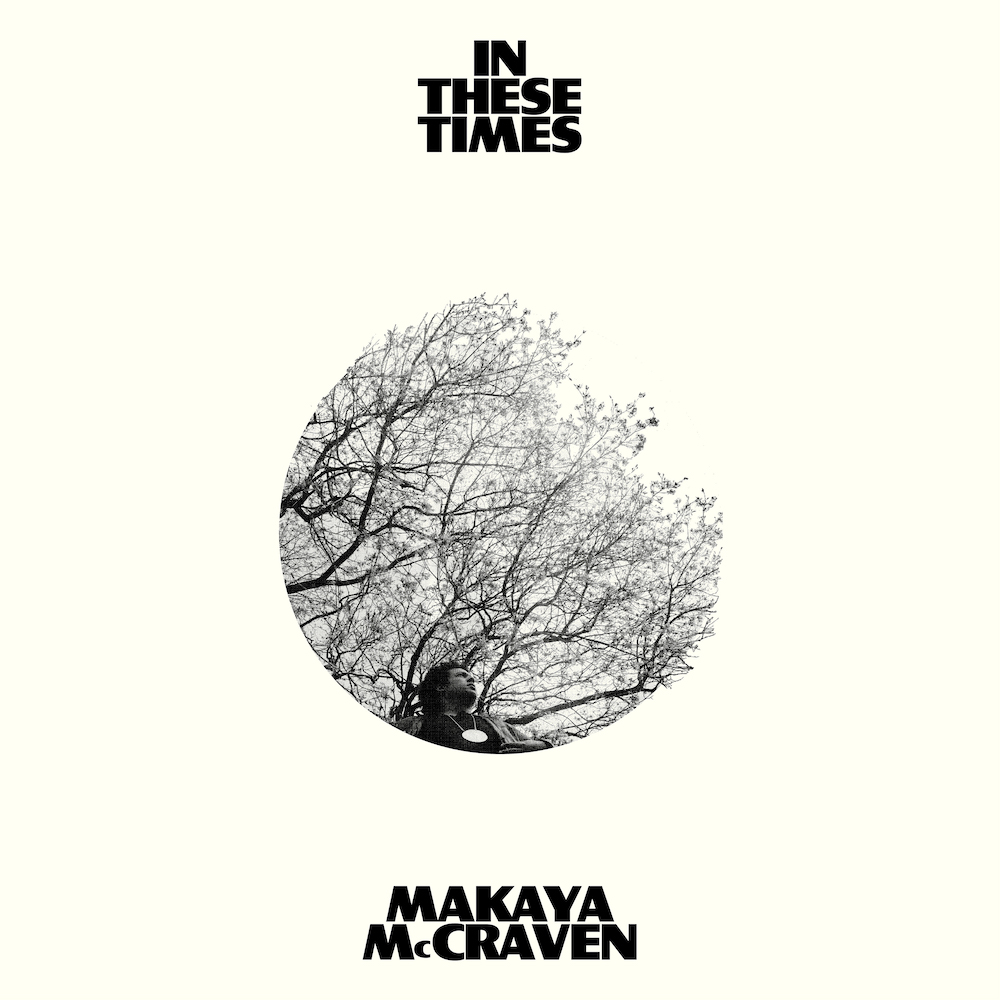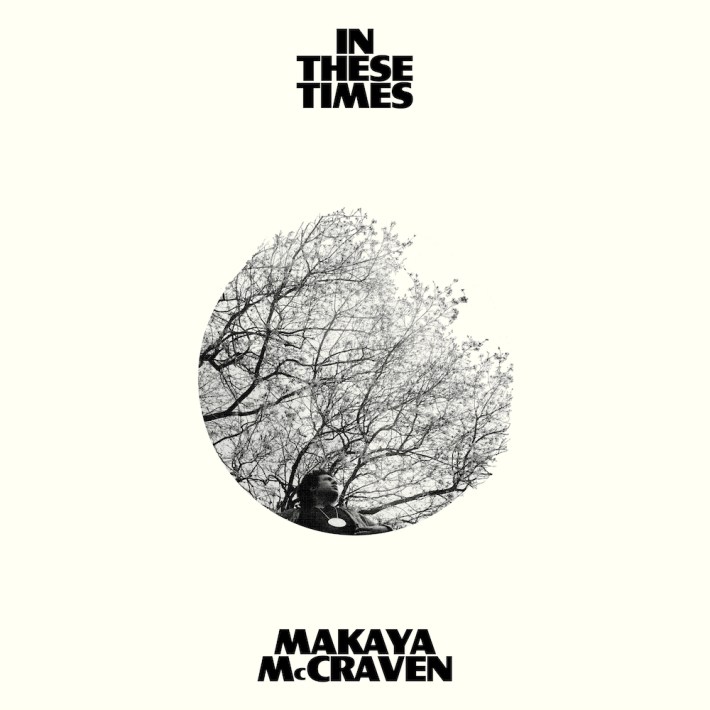- International Anthem/Nonesuch/XL
- 2022
Makaya McCraven has been working on In These Times for almost as long as we've known him. Since 2015, McCraven has been on a prolific streak, releasing a host of varying projects, often to critical acclaim, while steadily garnering that complicated yet hallowed mantle as one of those artists who is keeping jazz "alive." And all along the way, the seeds for In These Times were being conceived, written, performed, recorded, spliced, reimagined. It's immediately introduced as the statement he's been wanting to make, which comes with a certain promotional twist: "Oh, you like everything else this guy has done? Well this is what was really cooking in the background." But as formidable as McCraven's catalogue has already become, it's true. In These Times feels like his big statement. It delivers.
Albums like this come with a certain kind of weight — when someone has labored over music for years and years, you could imagine it being overwrought even if it's effective. There is no sense of that on In These Times. It's too graceful. There are complex compositions and goals at work here, but the way McCraven has painstakingly rendered them all, it just sounds like magic. Pulled from sessions and concerts across the years, In These Times is a document of many different years and places, all fused together into a seamless, dreamlike experience.
There is a functional culmination with In These Times. The project is the fuller realization of experiments McCraven was figuring out earlier on (2015's In The Moment being one important predecessor), one that ropes in new and old collaborators. But it's also the sound of spiritual and artistic concerns coalescing. The official announcement told us In These Times was inspired "as much by broader cultural struggles as McCraven's personal experience as a product of a multinational, working class musician community." The influence of his background — a jazz drummer father who played with greats of the genre and also collaborated with West African musicians, a vocalist mother who cut her teeth performing folk music back in Hungary — is more present than ever, with him trying to incorporate rhythms from both African and Eastern European music. The album finds him messing with odd-metered and polytemporal compositions — songs that incorporate more than one tempo at the same time — something that almost makes it feel like all those threads are in constant, bubbling conversation with one another. All of this falls under his long-standing reputation for making "organic beat music," in which he cuts, loops, samples, rearranges, collages recordings of live performances.
Whether or not you're familiar with McCraven's past work, all those details might make In These Times sound like something chaotic on paper. In reality, it's an album where you can see McCraven's vision developing patiently over time. Rather that a thing of drastic tension or sharp juxtapositions, In These Times is often fluid, elemental. On "Dream Another," wistful sighs of sitar and flute sound like a winding wind; Brandee Younger's harp, a sneaky MVP across the album, is often dancing around tracks like currents of water. So often, particular movements — the breathy saxophone leads on "The Fours," the cascades of harp on sustained strings of "This Place That Place" before its clattering conclusion, the airy layers of trumpets and strings on "The Calling" — can make the whole album feel as if it is floating high up in the clouds, collecting distant strains from down below and weaving them together into something new.
In These Times’ best moments are fairly evenly spread out — early on, there's the way the beat snaps into focus underneath the melodies of "The Fours," or how various instruments flicker and sputter around each other in "High Fives" — but it often feels as if the album's spell blooms as it goes. By the time you get into its second half, In These Times can almost be hypnotic on first listen. It makes a lot of sense that "Seventh String" was its lead single but kicks off the album's final third — it plays, in many ways, as the perfect distillation of McCraven's intent, riding on percussion that is furiously nonstop yet somehow gentle, tumbling but serene alongside Jeff Parker's fried guitar and De'Sean Jones' flute taking the lead. That and "The Knew Untitled" exemplify how the album turns beats and contrasts into something harmonious rather than messy; they are placed alongside the Eastern-tinged "So Ubuji" and the denouement of "The Title," both of which also showcase how McCraven's production and arrangement yield songs that can be equally elusive and infectious.
Anytime someone from the jazz world like McCraven gets a bit of crossover credibility — akin to a Kamasi Washington or a Shabaka Hutchings — they are made to discuss jazz today, what they envision as the limitations and/or future prospects of an old genre that long ago lost its mainstream currency and, as such, has been perceived as academic even if there are countless musicians still active within it. This is, in a sense, as played out as "rock is dead." Iconic jazz musicians of the mid-century were already long ago bristling at the perceived brackets or rules of the genre. In These Times might not exactly be the sort of foray into jazz that would take McCraven to the indie festival circuit, but it's a clear argument for the genre's ongoing malleability and expansiveness. There is history and technology colliding here, tradition spoken in contemporary lingua franca. As these songs shimmer then cohere, the real takeaway is how McCraven's music can seem to be presenting an idea or image, then turn over and reveal it was approaching it sideways before truly crystallizing it. Years went into the creation of In These Times, and in turn you could imagine spending years with this album, still discovering new slivers of beauty when the light hits it just a bit differently.
In These Times is out 9/23 on International Anthem/Nonesuch/XL.
https://youtube.com/watch?v=JWALx23jfw8
https://youtube.com/watch?v=Qsr7IYLhG1o
https://youtube.com/watch?v=3j-hffAqI7c
Other albums of note out this week:
• Alex G's God Save The Animals
• The Comet Is Coming's Hyper-Dimensional Expansion Beam
• Michelle Branch's The Trouble With Fever
• Cam'ron & A-Trak's U Wasn't There
• Beth Orton's Weather Alive
• Dr. John's posthumous Things Happen That Way
• The Soft Moon's Exister
• The Smithereens' The Lost Album
• Excide's Universal Revolver
• Nils Frahm's Music For Animals
• Lande Hekt's House Without A View
• Future Teens' Self Help
• Khruangbin & Vieux Farka Touré's Ali
• WILLOW's COPINGMECHANISM
• Marisa Anderson's Still, Here
• Editors' EBM
• The Tallest Man On Earth's Too Late For Edelweiss
• The Wonder Years' The Hum Goes On Forever
• Ellen Arkbro & Johan Graden's I get along without you very well
• 5 Seconds Of Summer's 5SOS5
• Marisa Anderson's Still, Here
• The reunited Casual Dots' Sanguine Truth
• Fujiya & Miyagi's Slight Variations
• Sector's The Chicago Sector
• Peter Matthew Bauer's Flowers
• Alivenique's Year Of The Statement
• Bloods' Together, Baby!
• Maya Hawke's MOSS
• Nikki Lane's Denim & Diamonds
• Tim Burgess' TYPICAL MUSIC
• Kelsea Ballerini's Subject To Change
• The Cradle - Radio Wars
• Maddie & Tae's Through The Madness Vol. 2
• Douglas Andrew McCombs' VMAK<KOMBZ<<<DUGLAS<<<6NDR7<<<
• VISUALS' Light Breaks
• Razor's Cycle Of Contempt
• Altopalo's Frenemy
• June Jones' Pop Music For Normal Women
• NEU!'s NEU! 50! box set
• Joni Mitchell's The Asylum Albums (1972-1975)
• Iceage's Shake The Feeling: Outtakes & Rarities 2015-2021
• Magdalena Bay's Mercurial World Deluxe
• Pale Sketcher's Golden Skin
• Billy Idol's The Cage EP
• Joshua Bassett's Sad Songs In A Hotel Room EP
• Tommy Emmanuel & Mike Dawes' Accomplice EP #3
• Chemical Club's Pale Blue Sky EP
We rely on reader subscriptions to deliver articles like the one you're reading. Become a member and help support independent media!







